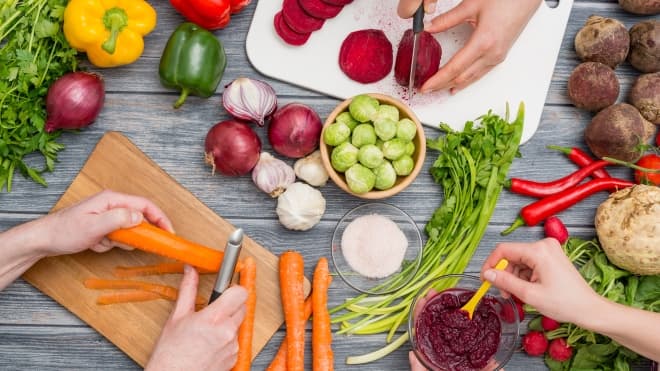Tips for drinking more water

Water is essential for every cell in the body to function correctly. Water aids the digestive system, helps prevent constipation, flushes toxins from the body, promotes good kidney function, keeps your joints and muscles lubricated, supports healthier and younger-looking skin, and helps regulate body temperature.
How much water do you need?
Whether you prefer plain, sparkling or infused water, drink plenty every day. So how much water does an average adult in a temperate climate need?
Mayo Clinic recommends this minimum daily intake of water:
- Women — 11.5 cups, or 92 ounces
- Men — 15.5 cups, or 124 ounces
You lose water through breathing, perspiring, urine and bowel movements. You must continually replace your body's water supply by eating food and drinking beverages that contain water. About 20% of the daily intake of liquid comes from food and the rest from drinks.
Anyone can become dehydrated, but certain people are at greater risk, including infants, young children and people who work or exercise outdoors. Even mild dehydration can leave you feeling tired and lacking energy.
In addition, older adults are more likely to become dehydrated. As you age, your body's fluid reserve becomes smaller, your ability to conserve water is reduced and your thirst sense becomes less acute. These problems are compounded by chronic illnesses such as diabetes and dementia, and the use of certain medications. Older adults also can have mobility problems that limit their ability to obtain water for themselves.
How do you know if you're drinking enough water?
Your fluid consumption is adequate for your needs if you rarely feel thirsty and your urine is colorless or light yellow. To prevent dehydration, consider drinking water regularly with meals, throughout exercising and when you feel thirsty.
Increasing your water intake may seem easy, but it can take a lot of work to remember to drink up.
Here are some tips for upping your water game:
- Flavor it.
Add fruit to your water. Lemons, limes and oranges are tried and true. Cucumber, watermelon, strawberries and herbs also are delicious options. - Tie it into a routine.
Drink a glass of water every time you brush your teeth, eat a meal or use the bathroom. - Eat it.
Many fruits and vegetables have a high water content, including melon, cucumbers, lettuce and celery. - Track it.
Invest in a high-tech bottle that connects to your smartphone and records how much you drink. Or set an alarm as a reminder and track your intake in your calendar. - Challenge a friend.
Kick off a healthy competition with a friend or your kids to see who can meet their guzzling goal most often. - Take it to go.
Drinking enough water when you are the go can be challenging. Fill your water bottle before you leave home, and bring it along on your daily travels. - Alternate your drinks.
If you can't give up soda or juice completely, try alternating with water. Each time you finish a glass of water, switch to soda or juice and vice versa.
Follow some of these tips to keep yourself and your loved ones properly hydrated.
Liana Reiland is a nurse practitioner in Family Medicine in Mondovi, Wisconsin.



